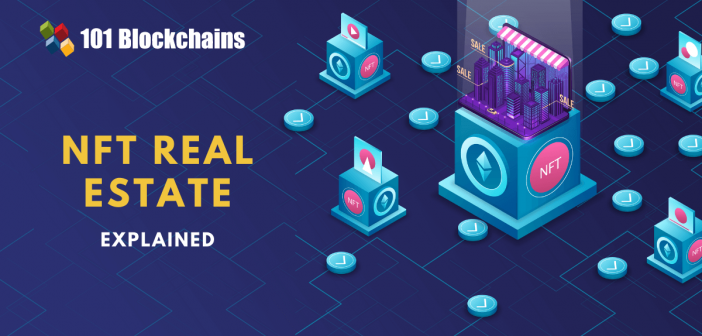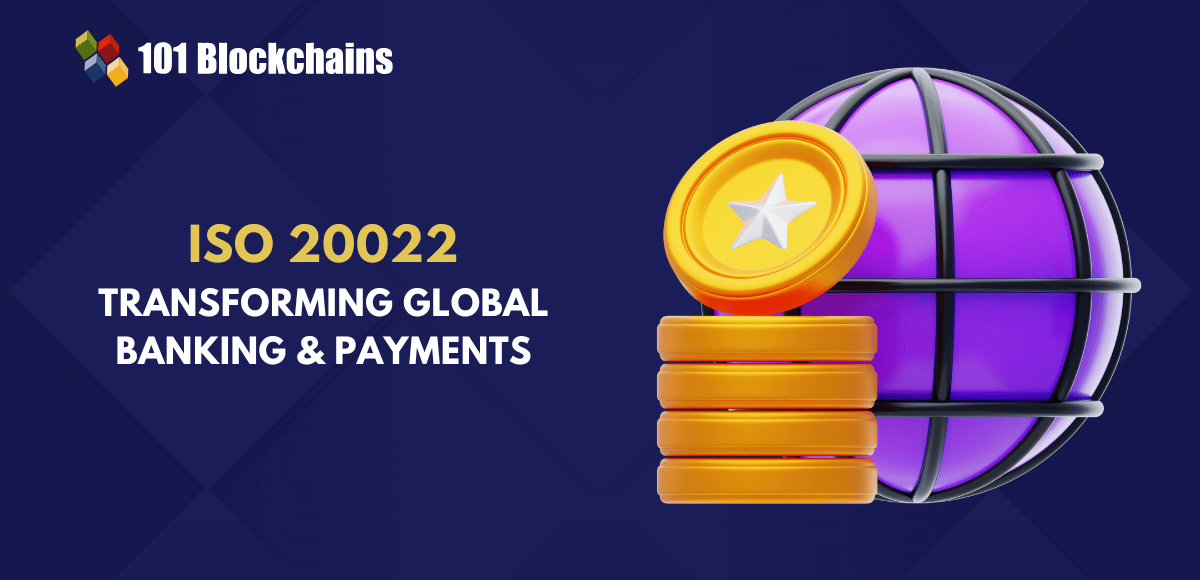Learn how blockchain truly works, master key definitions, and uncover what makes smart contracts so "smart." Dive into the fundamentals, gain valuable insights, and start your blockchain journey today!

- Guides
Georgia Weston
- on March 18, 2022
NFT Real Estate – Explained
Cryptocurrency, blockchain, NFTs, decentralized finance, and trustless computing have been some of the prominent tech trends in recent years. Today, you can find blockchain applications and cryptocurrency applications in various industries. At the same time, it is also important to notice the massive scale of digital transformation, which has changed the basic ways in which we purchase and sell products. The NFT real estate interplay has been grabbing attention from various circles, particularly for the value benefits of NFTs. However, it is also important to look at the feasibility of NFTs for the representation of real estate.
Will a property’s NFT hold the same value as a legal deed of ownership? What will happen when you want to sell the NFT of your property to another person? The following discussion offers you a detailed overview of the basics of NFTs in real estate. In addition, the post would also reflect on the potential challenges for the growth of NFTs in the real estate domain.
Is NFT Suitable for Real Estate?
Non-fungible tokens or NFTs have been in the news on a daily basis. Whether it is the million-dollar NFT art auctions or marketing gimmicks of popular fast-food chains, you can find NFTs everywhere. If you want to know the answer to “Can NFT be used in real estate?” you need to understand NFTs first. NFTs or non-fungible tokens are a new category of digital tokens, which you can purchase with crypto or fiat currency.
The distinctive highlight of an NFT refers to the allocation of sole ownership of digital assets through blockchain technology. With the help of traceability on the blockchain, it is easier to track and sell NFTs in public. As of now, the primary applications of NFTs rest in the field of selling digital music or art. Non-fungible tokens can help in the certification of product ownership with a unique, immutable signature.
However, the real estate NFT connection paints a completely different picture of NFT capabilities. Now, non-fungible tokens are slowly emerging as vital tools for representing ownership of physical items on blockchain networks. As a result, NFTs can serve as an ideal instrument for enabling the sale and purchase of real estate properties.
Want to get an in-depth understanding of non-fungible tokens (NFTs)? Enroll now in NFT Fundamentals Course
Why Should You Learn about NFT Real Estate?
Before finding more about NFT real estate, one would obviously wonder about the opportunities associated with the same. Are there any practical examples of representing real estate as NFTs?
In May 2021, Michael Arrington listed an apartment as an NFT through the real estate platform Propy. Interestingly, Michael had purchased the same property by using Ethereum smart contracts in 2017. Popularly referred to as the first real estate NFT in the world, it sold for more than $93,000.
In another instance, a real estate development firm, Prometheus, completed the sale of two luxury homes in Portugal through cryptocurrency. In addition, the firm also ensured the availability of ownership through NFTs.
The practical examples of popular property’s NFT sales show the potential hiding in NFTs for real estate management. Now, anyone would obviously seek insights on the possible reasons driving the use of NFTs for representing real estate on the blockchain.
Curious to learn about the intersection of blockchain and real estate? Enroll Now in Blockchain For Real Estate Masterclass
Reasons to Use NFTs for Real Estate
With a practical impression of “What is NFT in real estate?” through the practical examples, you have a basic idea of the reasons to use NFTs in real estate. Well, there is no way you can ignore the benefits of credible, transparent, and immutable ownership proof with non-fungible tokens. Let us take the example of conventional real estate for assessment.
One of the biggest setbacks in real estate investments emerges in the form of property ownership transfers. Presently, you would need humongous volumes of paperwork for purchasing a property. On the other hand, NFT real estate transactions offer better efficiency with improved streamlining.
Another important highlight for the use of NFTs in real estate arises from the vulnerability of digital transactions to cyber fraud. On the contrary, a real estate NFT marketplace provides the assurance of improved security and data integrity. The benefits of blockchain and NFT could provide the confidence buyers, and sellers need for transferring their assets. Buyers could also find opportunities for borrowing against their real estate NFT on DeFi or traditional finance solutions on blockchain. As a result, NFTs can also simplify the process of taking out loans on your property.
Get familiar with the terms related to Non-Fungible Token (NFT) with NFT flashcards!
Practical Use of NFTs in Real Estate
Till now, you know that NFTs are unique digital assets or tokens for virtual or physical property stored on blockchain networks. As a result, owners of a property’s NFT can prove that they own the property. In addition, NFTs can resolve the unwanted concerns of fraud. However, the practical uses of non-fungible tokens in real estate come with some additional complexities. You can find two distinct types of tokenization in the use of NFTs for real estate, such as entire asset tokenization and fractional ownership tokenization.
The concept of fractional ownership tokenization is a common answer for “Can NFT be used in real estate?” for many right reasons. Fractional ownership or FO tokenization offers a simple approach to the representation of real estate as NFTs. You can think of fractional ownership tokenization as a crowdfunding platform, which helps investors in buying shares. The fractional owners have a specific number of tokens representing their share in the asset.
Entire asset or EA tokenization is a completely different concept and needs conversion of the actual property deed into an NFT. As of now, EA tokenization encounters some formidable setbacks due to the regulatory concerns pertaining to real estate investments. Therefore, fractional ownership tokenization presents a better alternative than entire asset tokenization in terms of simplicity.
Learn the concept, elements, future and use cases of NFTs from Non Fungible Tokens (NFTS) E-Book
Working of NFT Real Estate Interplay
The fundamentals of the real estate NFT connection clearly establish why NFTs are probably the future of real estate. Now, you must be eagerly looking forward to the mechanisms of using NFTs for real estate. In the first step of selling real estate in the form of NFTs, you need to fulfill all the mandatory legal prerequisites for ensuring regulatory compliance. You should consult with a legal expert who has experience in blockchain technology and its legal aspects.
After clearing up the legal formalities, you can move to the next step by minting an NFT. You can mint an NFT with a description of the property and legal data associated with the same. In this case, you would need a real estate NFT marketplace, which offers a safe and flexible environment for creating NFTs. The marketplace helps you incorporate all the necessary paperwork, reports, and disclosures for legal authorities to offer proof of ownership.
Interestingly, you can sell your property’s NFT on an NFT marketplace to potential buyers. Interested buyers would place their bids for the NFT, and the winner would pay for the NFT in crypto or fiat currency. Once you receive the funds, you can initiate a transfer of the NFT to the buyer’s wallet. On the other side, buyers would complete the paperwork for finalizing the transfer. In the end, the buyer gains complete ownership over the property through the non-fungible token representing it.
Build your identity as a certified blockchain expert with 101 Blockchains’ Blockchain Certifications designed to provide enhanced career prospects.
Challenges for NFTs in Real Estate
Just like every revolutionary technology, whether it is the mobile phone or the internet, people are wary of NFTs in real estate. What is NFT in real estate? Many people are asking this question, particularly because the real estate sector is a slow-changing industry. Only recently, virtual tours and technological advancements have been taking over the real estate sector. As professionals and buyers in real estate struggle with new technologies, is it reasonable to introduce NFTs? Well, there are some noticeable challenges with the adoption of NFTs in the real estate sector.
First of all, you would have the obvious resistance to a new technology playing foul in the adoption of real estate NFT alternatives. Most importantly, blockchain and NFTs challenge the status quo of many intermediaries, which happen to be title companies. Therefore, we may have to wait for quite some time before we actually witness large-scale applications of NFTs in real estate.
Start learning Non-Fungible Token with World’s first NFT Skill Path with quality resources tailored by industry experts Now!
Final Words
The final impression regarding the NFT real estate connection clearly establishes a favorable precedent for the future. Real estate has been plagued with concerns of inefficiency and fraud due to cumbersome procedures and vulnerable proofs of ownership. For example, anyone could forge the property ownership documents of an individual and exercise unauthorized claims.
In such cases, non-fungible tokens bring much-needed change with solid proof of ownership for real estate. You don’t have to worry about proving that you are the owner of your property. A property’s NFT shows who the rightful owner of the property is and tells about the previous owners of the property.
*Disclaimer: The article should not be taken as, and is not intended to provide any investment advice. Claims made in this article do not constitute investment advice and should not be taken as such. 101 Blockchains shall not be responsible for any loss sustained by any person who relies on this article. Do your own research!






